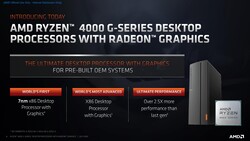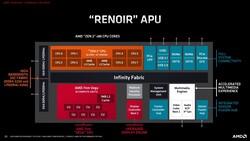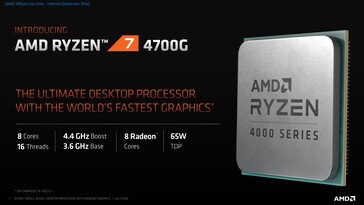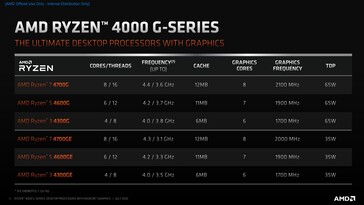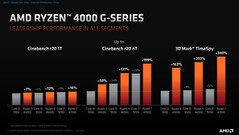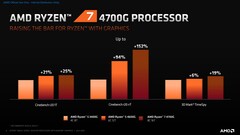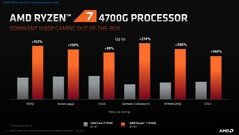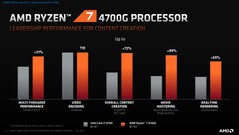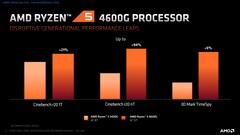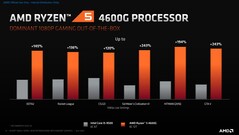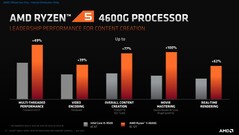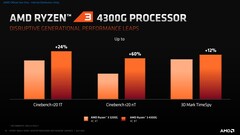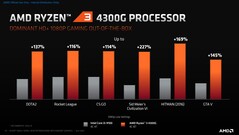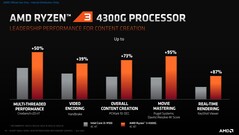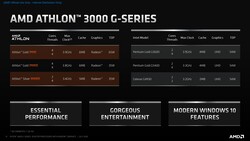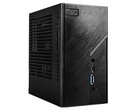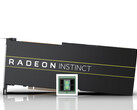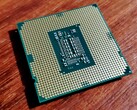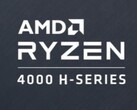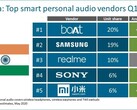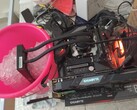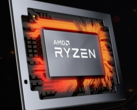AMD annonce la série Ryzen 4000G des APU Renoir pour les ordinateurs de bureau OEM pré-construits ; elle affirme avoir fait un grand pas en avant par rapport à la 9ème génération de Coffee Lake d'Intel
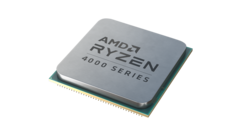
On a longtemps entendu dire que les APU d'AMD Renoir allaient bientôt arriver sur le bureau. Les APU Renoir ont fait leurs preuves sur les ordinateurs portables et ce n'était qu'une question de temps avant qu'ils ne fassent leur apparition sur les ordinateurs de bureau. Aujourd'hui, AMD a officiellement annoncé la disponibilité des APU Ryzen 4000 Renoir pour les ordinateurs de bureau, avec la promesse d'un gain de performances et la possibilité d'exécuter des jeux populaires à 1080p entre des paramètres bas et moyens sans avoir à investir dans un GPU discret.
AMD a annoncé des versions grand public et commerciales des processeurs Ryzen 4000G et Athlon 3000G, les opposant à la série Coffee Lake de 9e génération d'Intel. Mais il y a un hic.
Ryzen 4000G for pre-built OEM systems only, new APUs and CPUs coming soon for DIY
AMD is introducing Renoir desktop APUs today targeting only pre-built systems from OEMs such as Dell, HP, Lenovo, and the likes. These processors will not be available to system integrators and definitely cannot be purchased off the shelf.
AMD, however, confirmed that next gen APUs and CPUs for DIY users will be coming soon but declined to share any further details.
Top 10
» Le Top 10 des PC portables multimédia
» Le Top 10 des PC portables de jeu
» Le Top 10 des PC portables de jeu légers
» Le Top 10 des ordinateurs portables bureautiques
» Le Top 10 des PC portables bureautiques premium/professionnels
» Le Top 10 des Stations de travail mobiles
» Le Top 10 des Ultraportables
» Le Top 10 des Ultrabooks
» Le Top 10 des Convertibles
» Le Top 10 des Tablettes
» Le Top 10 des Tablettes Windows
» Le Top 10 des Smartphones
» Le Top 10 des PC Portables á moins de 300 euros
» Le Top 10 des PC Portables á moins de 500 euros
» Le Top 25 des meilleurs écrans d'ordinateurs
Platform features — Same as Ryzen 4000 for mobile
AMD confirmed that the desktop Ryzen 4000G processors sport exactly the same configuration as their laptop variants with the only differences being the TDP and clock tuning. AMD is still yet to provide further technical details, but everything we've seen with mobile Ryzen 4000 applies to desktop as well in toto. What this means is that Ryzen 4000G is still a monolithic Zen 2 die with support for eight lanes of PCIe Gen3 for the discrete GPU (if the OEM decides to include one). Memory support is also the same as that of mobile Ryzen 4000 i.e. up to DDR4-3200. And no, it will not be possible to have an SLI/CrossFire-esque functionality between the Radeon iGPU and a dGPU.
SKUs: Ryzen 7 4700G leads the pack
The Ryzen 4000G family is comprised of a total of six SKUs — three 65 W and three 35 W with the flagship processor being the Ryzen 7 4700G. The Ryzen 7 4700G sports eight cores and 16 threads, has a 12 MB cache, is clocked at 3.6 GHz base with boost up to 4.4 GHz, and features Radeon RX Vega 8 graphics clocked at 2,100 MHz. The extra TDP headroom allows the processor to have added CPU and GPU clocks compared to its closest laptop counterpart, the Ryzen 9 4900H.
Following the Ryzen 7 4700G are the Ryzen 5 4600G and the Ryzen 3 4300G. While the G series is rated at 65 W, the GE series are 35 W parts with reduced CPU and GPU clocks.
Performance
AMD also showed off some performance metrics comparing the Ryzen 4000G against competing offerings from Intel 9th gen chips. Of course, these are AMD's numbers and we will have to test the claims ourselves to be sure. However, we do get an idea of the kind of performance boosts that can be expected from this lineup.
The Ryzen 7 4700G showed significant leads in both single and multi-core Cinebench tests when compared with the Core i7-9700. The maximum performance delta was seen in the multi-core tests as expected since the Core i7-9700 does not feature hyperthreading. The difference in 3DMark Time Spy scores was also substantial when compared with Intel's offerings.
When Ryzen 4000 for laptops was announced, AMD said that they had worked on increasing the performance of each compute unit (CU) in the graphics core. This is the reason why a Radeon RX Vega 8 in Ryzen 4000 can deliver up to 59% higher performance per CU compared to a Radeon RX Vega 11 in Ryzen 3000 APUs. With increased TDP headroom up to 65 W, that number has now gone up to nearly 64% and it shows in both synthetic and real world gaming benchmarks.
This increased GPU throughput enables Ryzen 4000G to offer decent 1080p gaming in popular games at low to medium settings without having to invest in a discrete GPU. This should also benefit content creation apps and help accelerate certain workflows.
Check out some of the performance slides from AMD's presentation below for the Ryzen 7 4700G, Ryzen 5 4600G, and the Ryzen 3 4300G.
Athlon 3000G announced as well
Additionally, AMD also announced the new Athlon 3000G lineup based on Zen+ cores to take on Intel's Pentium Gold and Celeron offerings. The Athlon lineup is comprised of two 4C/4T Athlon Gold parts, the Athlon Gold 3150G and 3150GE, with 65 W and 35 W TDP, respectively along with an Athlon Silver 3050GE, which is a dual-core 35 W part. In comparison with the Intel Pentium Gold G5600 and G5400 offerings, the Athlons feature double the cores, higher clocks, and a larger cache. The new Athlon 3000G series will also be available exclusively for pre-built OEM systems.
Source(s)
AMD Press Brief


